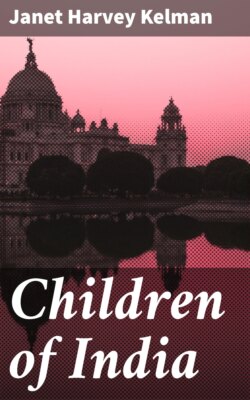Читать книгу Children of India - Janet Harvey Kelman - Страница 4
На сайте Литреса книга снята с продажи.
CHAPTER II
THE STORY OF THE GANGES
ОглавлениеTable of Contents
Very long ago, though the mountains stood at the world’s centre, and India lay at their feet, there was no Ganges river, and the plains lay bare and fruitless. The god Siva then lived on the top of a high mountain, and spent his time in thought. Up over his head above the mountains the Princess Ganga lived free as the wind. She was the daughter of King Himalaya, and the air nymph Menaka, and so her home was in the air among the heights.
At that time there lived a very wise man on earth, and, as he looked at the burning plains of India, and thought of the air princess, he said to himself, “If she would only give up her freedom and become a river, how she could enrich and purify the earth.” And when he had thought this out, he began to pray to the god Siva to send Ganga to earth. Siva granted his request, and the Princess floated down to earth. She touched it first at the mountain top where the god sat, but he caught her in the tangled masses of his hair, and for ages she could not escape from them, so the wise man could not see the answer to his prayer. But long long afterwards, she broke away from her prison on the mountain top, and flowed down under the glacier ice, and over the bare grey rocks. She made her way through the ravines, and the great pine woods sprang up as she flowed. Rhododendrons grew on the banks at her coming, and at the foot of the mountains the jungle stretched down to be nourished by her waters. But it was out on the open plain that the Princess Ganga really showed her power. There, fields of wheat and rice and poppies and lentils grew up wherever she flowed, and wherever the streams that joined her from the mountains made their way to reach her. Groups of fruit trees and bamboos grew too, and men came to settle in villages beside them till the plain of the Ganges became a great, bright, busy place with herds of buffaloes watched by little boys, with oxen yoked to the plough, and other oxen carrying the precious river water to pour it on fields that were far from the banks.
But the Ganges is far more than the bringer of food and life to the Hindus, for the sage prayed that the river might flow to bear away the sin of men, and that is a far greater thing than only to bring food. But we must remember that sin means something different to a Hindu child from what we think of as sin. To him it does not mean unkindness, or cruelty, or lying, or even murder; it means breaking the rules of custom.
Because of the sacredness of the Ganges men bathe in it, and pray to die beside it, that after their bodies have been burned on its banks the ashes may be scattered over its waters, and allowed to float away far out to sea. They hope that if that happens, their souls will be lost in the great unknown spirit in which they believe, as the river is lost in the ocean.
Every bend of the Ganges is sacred, and each place where a stream joins it, is yet more holy. Pilgrims go from its mouth to its source and back again. If they walk, they take six months to the pilgrimage, but if they wish to win more merit, they lay themselves down on the ground and cover miles of the bank with their bodies instead of with their feet, and that takes far longer.
There is a great gorge where the Ganges flows out on to the open plain. Near it stands the town of Hardwar, and on the Hindu New Year’s day dense crowds of pilgrims gather there in honour of the birthday of the river. They bring the ashes of the dead whom they have loved with them, and as they throw them on the flowing water they feel that they have done for their friends the very greatest thing they could do. Then at a certain moment each pilgrim struggles to be first to bathe in the river.
The most sacred city is Benares, and all the year long its streets and temples and river banks are thronged with pilgrims. They bathe, and throw sandal-wood, sweets and flowers into the river. Some of them wear garlands, and, as they bathe, the garlands rise from their breasts on the water, and float down the current. Then the pilgrims go round the sacred city, a walk of ten miles, and afterwards they offer flowers and gifts in as many temples as possible. After all is done, they turn homewards across the plain, unless they are so old or so ill that they may hope to die soon. If they are, they stay on in the strange city in poverty and pain, for to die in Benares is a better thing to them than to be amongst friends or in the home of their childhood.
But flowers and ashes are not the only gifts that have been offered to the Princess Ganga. Once little living babies were thrown to her waters, and old men and women have been left to her mercy by those who were too heartless or too poor to feed them. These terrible offerings are not seen now, for the British Government has forbidden anyone to throw any living person into the river.
